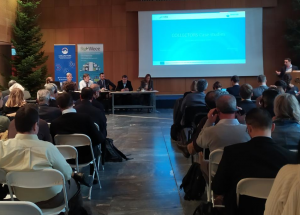On 11 December, the COLLECTORS project organised its fourth public conference in collaboration with the ReWEEE project. The conference was opened by Nikolaos Zeimpekis, City Councillor in charge of waste management at the Municipality of Thessaloniki, which was also the host of the event. He spoke about the new waste strategy that the municipality will implement in the coming years to a large audience composed of European experts and many different stakeholders from Greece.
The overall focus of the event was how to transition from municipal waste management systems to circular economy strategies. This topic was addressed during three panel discussions that followed after the opening speech and that brought together local players, European experts, and COLLECTORS partners. The event also featured the presentation of the latest COLLECTORS findings regarding the environmental and economic impact of good practices, the lessons learnt from documented case studies, and the need to better align current waste collection system with the needs and requirements of the recyclers.
The first panel looked at current challenges and opportunities for municipal waste management and started with an overview of the national waste framework by Marina Papadaki from the Hellenic Recycling Agency. Subsequently, Dimitrios Tsiftelidis from Anatoliki SA, a municipality-owned research company, introduced the upcoming brown bin, which will be used in several Greek municipalities to collect bio-waste. Catherine Van Nieuwenhove of Brussels Environment also explained how the institution cooperates with other Belgian regions, the Belgian police and customs to tackle the challenging issue of illegal exports of WEEE.
The second roundtable focused on the waste management practices necessary to reach the upcoming EU recycling targets. Two interventions from the Greek extended producer responsibility schemes for packaging waste and WEEE, represented by Dimitris Papasotiriou of the Hellenic Recovery Recycling Corporation and Haris Angelakopoulos of Appliances Recycling SA respectively, highlighted the current challenges and good practices for packaging waste and WEEE. Both presenters discussed the recent progress made towards recycling these two waste fractions, but also called for a more active involvement of local authorities to increase the low capture rates at the moment.
In addition, two representatives of European local authorities were invited by the project to discuss their experience in improving waste recycling. Eifion Williams from Circular Economy Wales presented the Welsh success story, whereby the country transitioned from being one of the worst performing in waste management to a frontrunner in recycling in Europe. Liliana Nichita from the Romanian Federation of Intercommunity Development Associations explained how several Romanian local authorities recently improved selective collection through the implementation of an adequate national framework, the development of door-to-door collection, and the improvement of monitoring and benchmarking among local players.
The final panel brought together a series of speakers who highlighted the need to adjust current collection practices to make them more suitable for recovery through re-use and recycling. The different speakers acknowledged the limitations of current collection systems, which primarily focus on collected quantities while disregarding the need for sorted fractions that can be used for high-quality applications. Case in point, Herman Van Roost, the President of the Belgian organisation PLAREBEL, insisted on the necessity to close loops at earlier stages of the production, consumption, and end-of-life cycle. Doing so would not only enable the creation of quality sorted materials or products, but would also significantly reduce the overall costs of materials capturing and sorting. In order for this to be possible, every player in the value chains has to improve the recyclability of products and virgin materials need to be better used – for example, as boosters of recycled materials, he insisted.
The different presentations are available on the COLLECTORS website.